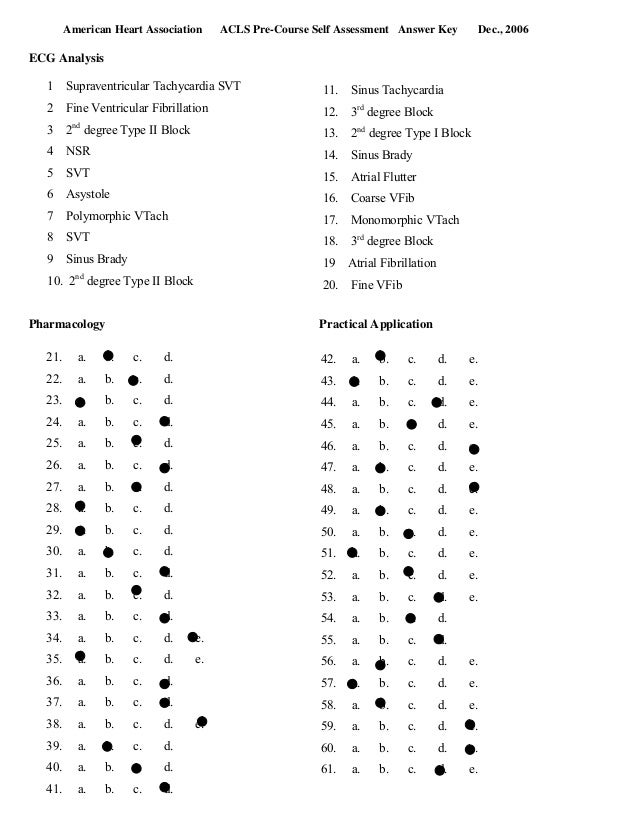Imagine the pressure. You’re in a hospital, the heart monitor screams, and a patient’s life hangs in the balance. You need to act fast, execute precise procedures, and make split-second decisions. This is the reality for healthcare professionals working in critical care situations. The American Heart Association’s (AHA) Advanced Cardiac Life Support (ACLS) course is designed to equip them with the necessary knowledge and skills to handle these high-pressure situations, and passing the ACLS exam is the key to unlocking those life-saving capabilities.

Image: education2research.com
The ACLS exam is a rigorous test that evaluates your understanding of cardiac arrhythmias, emergency procedures, and the protocols used to manage cardiac arrest and other life-threatening events. It’s not just about knowing the information, but also about applying it with confidence and accuracy under simulated stress. While passing the exam is essential, it’s crucial to approach it with a well-defined strategy, proper preparation, and a dash of understanding about how the AHA structures its testing.
Stepping Stones to ACLS Mastery: The Journey Begins
AHA’s ACLS course is more than just a theoretical lecture; it’s a comprehensive immersion into the practical aspects of advanced cardiac life support. The course covers a wide range of vital topics, giving you the tools to manage even the most complex emergencies. Here’s a breakdown of some key areas covered in the course:
- Cardiac Arrhythmias: The Rhythm of Life & Death: The course delves into the fascinating world of cardiac rhythms, teaching you how to interpret ECGs (electrocardiograms). You’ll learn to recognize the dangerous arrhythmias, understand the underlying causes, and master the necessary interventions to restore a normal heart rhythm.
- Airway Management: Ensuring a Clear Passage: This is a fundamental skill in ACLS. You’ll be trained in different techniques for securing an airway, from simple maneuvers like the jaw thrust to more advanced procedures like intubation. You’ll learn techniques for maintaining the airway, even under difficult conditions, ensuring that oxygen reaches the patient’s lungs.
- Pharmacology: Dosing and Administering Medications Precisely: ACLS involves the use of various drugs to manage specific complications. You’ll learn about the different medications used in cardiac emergencies, their indications, contraindications, proper dosages, and the routes of administration.
- Defibrillation: An Electric Shock to the Heart: You’ll gain a deep understanding of defibrillation, the application of an electrical shock to the chest to reset the heart’s rhythm. You’ll learn the protocols for defibrillation, the placement of paddles, and how to effectively use this life-saving procedure.
- Advanced Cardiac Life Support Algorithms: These algorithms are your roadmap to successful management of cardiac emergencies. They provide a step-by-step guide to assessing the situation, initiating interventions, and monitoring the patient’s response. You’ll learn to use these algorithms effectively, applying them in real-life scenarios.
- Team Dynamics: Working Together to Save Lives: ACLS emphasizes a team approach, recognizing that critical care is a collaborative effort. You’ll learn how to communicate effectively with other healthcare professionals, delegate responsibilities, and work cohesively to achieve the best possible outcome for the patient.
Decoding the ACLS Exam: A Blueprint for Success
Now, let’s get down to the nitty-gritty of the ACLS exam itself. The AHA offers two main formats for the exam:
- Computer-Based Exam: This is the most common format. You’ll be presented with multiple-choice questions, scenarios, and simulations. The questions cover a wide range of topics, from basic ACLS principles to complex clinical scenarios.
- Written Exam: This format is less common and typically involves a combination of multiple-choice questions and short-answer questions, testing your ability to think critically and apply your knowledge in a written format.
To excel on the ACLS exam, the key is preparation. It’s not a test you can breeze through with last-minute cramming. Here are some crucial strategies to help you conquer it:
- Immerse Yourself in the ACLS Course Materials: The AHA provides comprehensive resources, including textbooks, online modules, and practice scenarios. Take the time to thoroughly study these materials, understanding the underlying concepts behind the protocols and guidelines.
- Focus on the Exam Objectives: The AHA clearly outlines the exam objectives on its website. Familiarize yourself with these objectives, ensuring you have a deep understanding of each area tested. This will help you prioritize your study efforts.
- Practice with Online Simulations: One of the best ways to prepare is to work through online simulations. These simulations mimic real-life scenarios, testing your knowledge and decision-making skills in a pressure-filled environment. You’ll learn to identify the right interventions and implement them effectively.
- Study in Groups with Fellow Students: Teamwork makes the dream work! Studying with peers allows you to discuss challenging concepts, test your understanding, and learn from each other’s perspectives. It can help solidify your knowledge and boost your confidence.
- Stay Up-to-Date with the Latest AHA Guidelines: The AHA periodically updates its guidelines, so it’s crucial to stay informed about the latest changes. Check the AHA website regularly for updates and ensure your study materials are current.
Beyond the Exam: A Lifelong Commitment
Passing the ACLS exam is a significant achievement, but it’s only the beginning. Your journey doesn’t end there. True mastery of ACLS requires ongoing learning, practice, and a commitment to staying up-to-date with advancements in the field.
The AHA encourages healthcare professionals to engage in ongoing continuing education. You can participate in refresher courses, attend conferences, and engage in self-study to keep your ACLS skills sharp. This commitment will ensure that you’re always prepared to confront the unpredictable demands of critical care situations.

Image: www.slideshare.net
American Heart Association Acls Exam Answers
Final Thoughts: Embracing the Challenge
The American Heart Association’s ACLS certification is not just a badge of honor; it’s a testament to your dedication to saving lives. The exam may seem daunting, but armed with the right strategies, preparation, and a relentless commitment to your learning, you can confidently navigate the path to success. Remember, every life saved is a testament to your hard work and the impact you’re making on the world.





